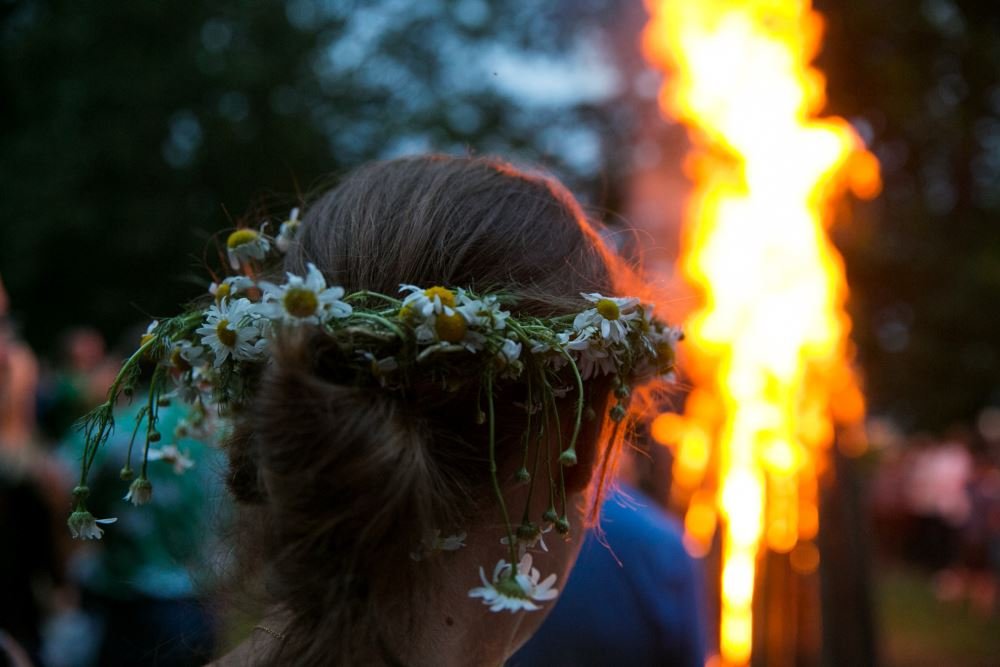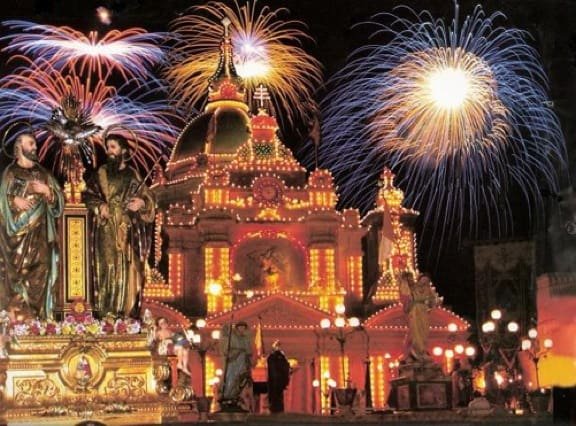Chronos, Kairos and Aion are the three deities of time, events and epic destinies. Here is the multi-religious and multicultural calendar!
Find us on our website Mythology and Legend, on Facebook and on instagram !

The schedule in brief from D-2 to D+5
- 30 June 2024, Daily: Alarde de San Marcial
- July 2, 2024, : Palio di Siena
- 3 July 2024, Daily: Days of the Dog
- July 4, 2024, : Huey Tecuilhuitl
- July 5, 2024, : Tynwald Festival
- July 5, 2024, : Poplifugia
- July 6, 2024, : Jan Hus
- July 6, 2024, : Kupala
- July 6, 2024, : Ludi Apollinares
- 6 July 2024, Every day: Mindaugas
- July 7, 2024, : Caprotinia
- 7 July 2024, Daily: San Fermín Festivities
The complete interactive calendar
Semaine du 2024-06-24
| Mymonday | Killtuesday | Wednesdaywednesday | ThuThursday | Frifriday | Satsaturday | Sunsunday |
|---|---|---|---|---|---|---|
Jun 24, '24June 24, 2024●●(6 events) Fors FortunaJune 24, 2024  On this day, the Romans celebrated Fortuna, the goddess of luck. His worship comes from the legendary early kings of Rome. Temple cults are little known today. #mythology #myth #legend #calendar #June 24 #fortuna Inti RaymiJune 24, 2024  On this day, the Incas celebrated Inti Raymi in honor of the sun god Inti. It was also the Inca New Year with the return of the lengthening of the days (June solstice). #mythology #myth #legend #calendar #June 24 #inca #IntiRaymi Jaanipäev –  Today, Estonians celebrate Jaanipäev (Saint John). The pre-Christian roots endure. Jaanipäev marks a change in the agricultural year, particularly the break between the end of spring sowing and the hard work of summer haymaking. Dancing, singing and jumping over a bonfire are also rites of this region. #mythology #myth #legend #calendar #Jaanipaev #estonia #June 24 JonsmessaJune 24, 2024  Today, Icelanders celebrate Jónsmessa. According to legends, cows gain the power to speak, seals become human, and it is healthy to roll naked in dew-covered grass. #mythology #myth #legend #calendar #June 24 #island #jonsmessa Saint Jonah –  Today, Lithuanians celebrate Saint Jonah, known by the pre-Christian name Rasos, Joninės, or Kupolė. Traditions include singing songs and dancing until sunset, telling stories, searching for the magic fern flower at midnight, jumping over bonfires, greeting the rising midsummer sun, and bathing. their faces with morning dew, young girls float crowns of flowers on the water of lakes or rivers. #mythology #myth #legend #calendar #June 24 #SaintJonas #Lithuania SanzianaJune 24, 2024  Today, Romanians celebrate Sânziene. The most beautiful women dress in white and make crowns of small yellow flowers. In the evening, dancing and singing take place around a large bonfire. #mythology #myth #legend #calendar #June 24 #sanziana #Roumania | Jun 25, '24June 25, 2024 | Jun 26, '24June 26, 2024 | Jun 27, '24June 27, 2024 |
Jun 28, '24June 28, 2024●●(2 events) Mnarja –  Today, the Maltese celebrate Mnarja, Saints Peter and Paul. It dates back to the time of the Knights of Malta in the 16th century. The name derives from the Latin word “Luminare”, meaning to illuminate. And it was precisely the lighting of candles and torches that made people feel their participation in the celebrations. However, over the years, the festival is no longer just a religious commemoration, but has changed its face, being enriched with new elements. Typical traditional dishes, parties, bonfires and fireworks show the best of Maltese folk tradition. #mythology #myth #legend #calendar #June 28 #mnarja #Malta Vidovdan –  Today, Serbs celebrate Vidovdan. This holiday is in honor of Saint Prince Lazar and the holy martyrs who fell in the Battle of Kosovo against the Ottoman Empire on June 15, 1389 (Julian calendar). This battle marks the invasion and submission of the Serbs by the Ottoman Empire. June 28 (Gregorian) is therefore a very important date in Serbian nationalism, and this day will be chosen for other great actions throughout History. #mythology #myth #legend #calendar #June 28 #Serbia #Vidovdan | Jun 29, '24June 29, 2024 |
Jun 30, '24June 30, 2024●(1 event) Alarde de San Marcial –  Today, the Basques do the Alarde de San Marcial (Parade of Saint Marcial). A parade commemorates the victory of the troops of Irun over the French army on June 30, 1522. They parade through the streets of Irun and head to Mount Saint Marcial where a great patronal festival is celebrated in honor to the Saint. #mythology #myth #legend #calendar #SaintMarcial #Irun #Basque #Euskadi #June 30 |
Multicultural and multi-religious almanac
An almanac is a calendar showing the main dates of the calendar, the religious holidays, bearing ephemerides such as the phases of the moon or the duration of the days (lunar and solar calendars).
A calendar is a system for marking dates according to time. Such a system was invented by men to divide and organize time over long periods. The observation of the periodic phenomena of the environment in which they lived — such as the daily movement of the shadow, the return of the seasons or the lunar cycle — served as the first references for organizing the agricultural, social and religious life of societies.
The calendar used today in most of the world is the Gregorian calendar. In everyday language, an ephemeris designates what happens daily; the ephemeris of the day is the list of the significant events of this day.